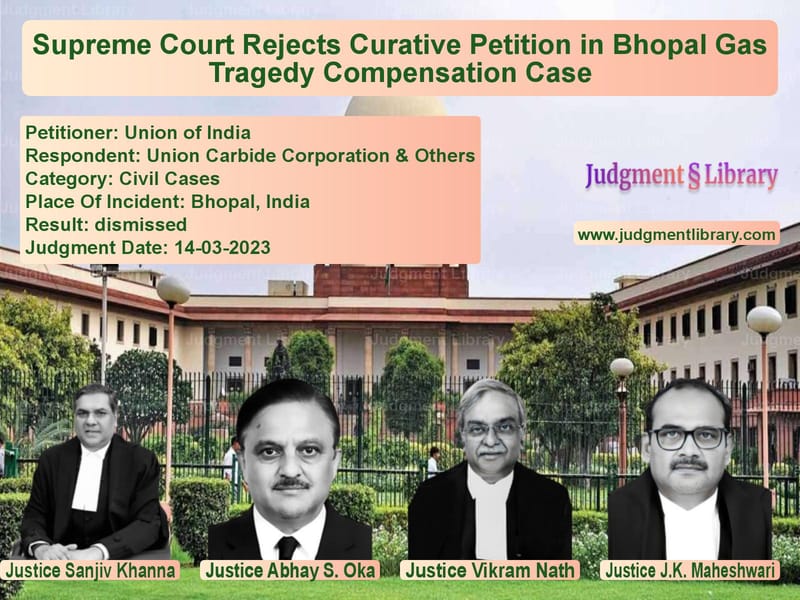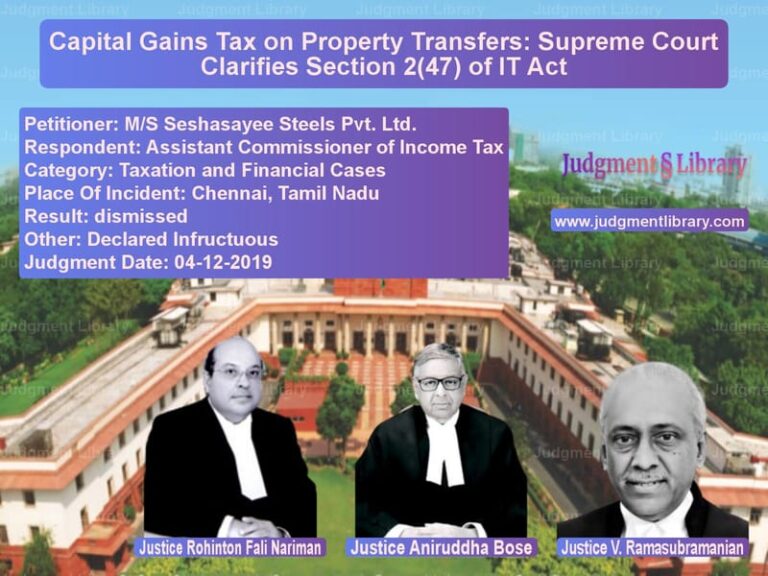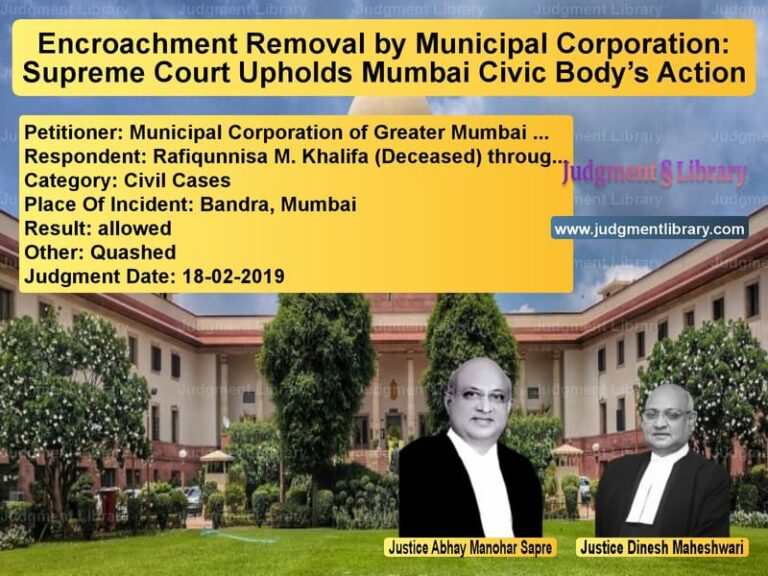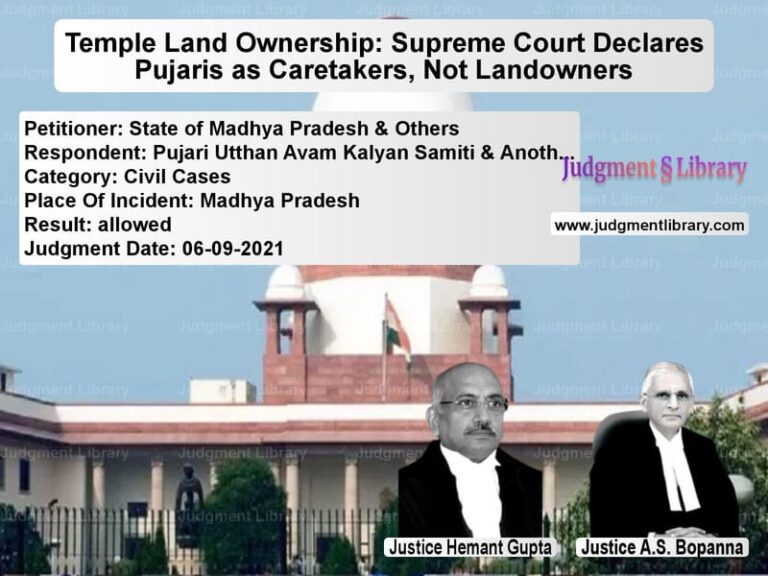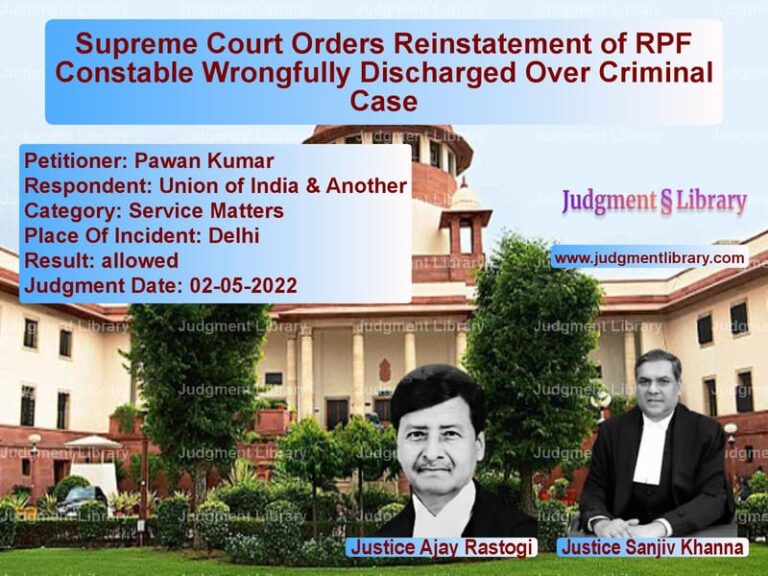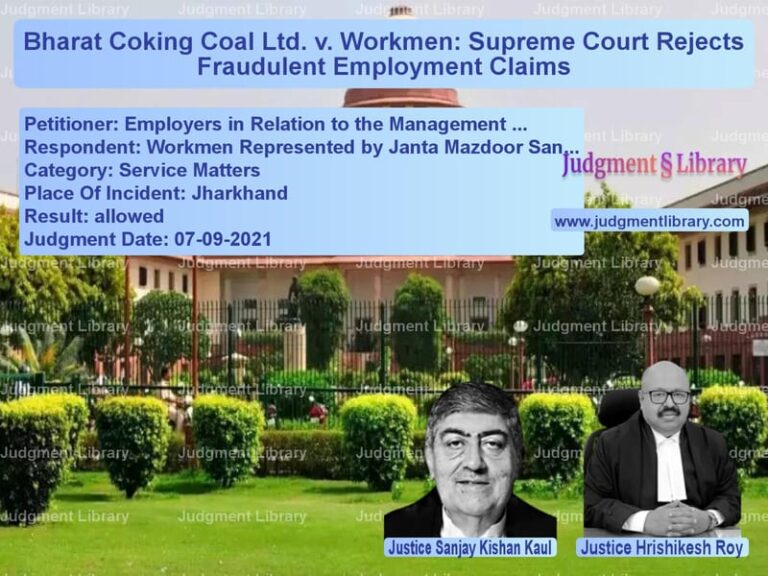Supreme Court Rejects Curative Petition in Bhopal Gas Tragedy Compensation Case
The Supreme Court has dismissed the curative petition filed by the Union of India seeking additional compensation from Union Carbide Corporation (UCC) for the victims of the Bhopal Gas Tragedy. The petition, filed nearly two decades after the 1989 settlement, sought to reopen the agreement and increase the compensation on the grounds of underestimation of victims and damages. However, the Court ruled that the settlement remains final, and any further responsibility for victim support falls on the Union of India as a welfare state.
Background of the Case
The Bhopal Gas Tragedy occurred on the night of December 2-3, 1984, due to the escape of toxic methyl isocyanate (MIC) gas from the Union Carbide India Limited (UCIL) plant in Bhopal. The tragedy resulted in thousands of deaths and serious health complications for many more.
Key developments leading to the dispute:
- 1985: The Bhopal Gas Leak Disaster (Processing of Claims) Act was enacted, granting the Union of India the right to represent all victims in legal proceedings.
- 1989: A settlement of USD 470 million was reached between the Union of India and UCC.
- 1991: The Supreme Court upheld the settlement but reinstated criminal liability against UCC executives.
- 2004: The Court noted that Rs. 1,500 crores remained unutilized from the settlement fund and ordered its distribution among victims.
- 2010: The Union of India filed a curative petition, seeking additional compensation based on a revised victim count.
- March 14, 2023: The Supreme Court rejected the curative petition.
Key Issues Raised
1. Was the 1989 Settlement Based on Incorrect Data?
The Union of India argued that the settlement was based on an incorrect assumption of 3,000 deaths and 50,000 injuries, whereas the actual figures were 5,295 deaths and 573,485 injuries.
2. Can the Settlement Be Reopened?
The petition sought to increase the compensation by approximately Rs. 7,844 crores, arguing that new evidence warranted a reconsideration of the settlement amount.
3. Can Environmental Damage Be Compensated?
The Union of India sought additional compensation of Rs. 486.78 crores for environmental degradation caused by the toxic waste left at the site.
Arguments by the Union of India
- The original settlement underestimated the number of victims and injuries.
- Additional funds were needed for long-term medical care and environmental remediation.
- The exchange rate fluctuations had increased the effective burden on victims.
- UCC should bear responsibility for additional compensation as it failed to ensure proper remediation.
Arguments by Union Carbide Corporation
- The settlement was final and had been approved by the Supreme Court.
- The Union of India did not file a review petition at the time and had opposed previous attempts to reopen the settlement.
- The settlement fund had grown due to interest accrual and exchange rate fluctuations, and additional compensation had already been distributed to victims.
- The legal principle of finality applied, and no new claims could be made against UCC.
Supreme Court’s Judgment
The Supreme Court rejected the curative petition, ruling that the settlement remains binding and cannot be unilaterally altered. The Court emphasized the following key points:
1. The Settlement Was Final and Binding
The Court held that reopening the settlement would create legal uncertainty and undermine the finality of judicial decisions.
“Either a settlement is valid or it is to be set aside for fraud. No such fraud has been pleaded by the Union of India.”
2. Additional Compensation Is the Union of India’s Responsibility
The Court noted that its 1991 judgment had explicitly stated that if the settlement fund was insufficient, the Union of India was responsible for covering any shortfall.
“The responsibility was placed on the Union of India, being a welfare State, to make good the deficiency.”
3. Environmental Damage Claims Were Not Part of the Settlement
The Court ruled that environmental damage claims could not be added to the settlement retrospectively.
4. Long-Delayed Claims Weaken the Case
The Court criticized the Union of India for filing the petition decades after the settlement, stating:
“The government has failed to provide any rationale for raising these claims more than two decades after the incident.”
Final Ruling
- The curative petition was dismissed.
- The settlement remains final and binding.
- The Rs. 50 crore remaining in the settlement fund is to be used for pending claims.
- The Union of India cannot seek additional compensation from UCC.
Implications of the Judgment
1. Legal Finality in Settlements
- Prevents reopening of settled cases unless there is clear evidence of fraud.
- Ensures stability in judicial decisions.
2. Responsibility of the Welfare State
- Reinforces that governments must bear responsibility for victim support in mass disasters.
- Ensures that victims receive adequate compensation even if corporate liability is settled.
3. Environmental Liability and Future Disasters
- Clarifies that environmental damages require separate litigation.
- Encourages governments to ensure timely clean-up efforts rather than seeking retrospective compensation.
Conclusion
The Supreme Court’s ruling in Union of India v. Union Carbide Corporation reinforces the principle of finality in legal settlements. While the tragedy remains one of the worst industrial disasters, the Court held that reopening the settlement after decades was not legally viable. The decision places the onus on the Union of India to continue supporting victims and ensuring environmental clean-up, emphasizing the role of the welfare state in long-term disaster management.
Petitioner Name: Union of India.Respondent Name: Union Carbide Corporation & Others.Judgment By: Justice Sanjay Kishan Kaul, Justice Sanjiv Khanna, Justice Abhay S. Oka, Justice Vikram Nath, Justice J.K. Maheshwari.Place Of Incident: Bhopal, India.Judgment Date: 14-03-2023.
Don’t miss out on the full details! Download the complete judgment in PDF format below and gain valuable insights instantly!
Download Judgment: union-of-india-vs-union-carbide-corpor-supreme-court-of-india-judgment-dated-14-03-2023.pdf
Directly Download Judgment: Directly download this Judgment
See all petitions in Damages and Compensation
See all petitions in Environmental Cases
See all petitions in Public Interest Litigation
See all petitions in Legal Malpractice
See all petitions in Contempt Of Court cases
See all petitions in Judgment by Sanjay Kishan Kaul
See all petitions in Judgment by Sanjiv Khanna
See all petitions in Judgment by Abhay S. Oka
See all petitions in Judgment by Vikram Nath
See all petitions in Judgment by J.K. Maheshwari
See all petitions in dismissed
See all petitions in supreme court of India judgments March 2023
See all petitions in 2023 judgments
See all posts in Civil Cases Category
See all allowed petitions in Civil Cases Category
See all Dismissed petitions in Civil Cases Category
See all partially allowed petitions in Civil Cases Category

